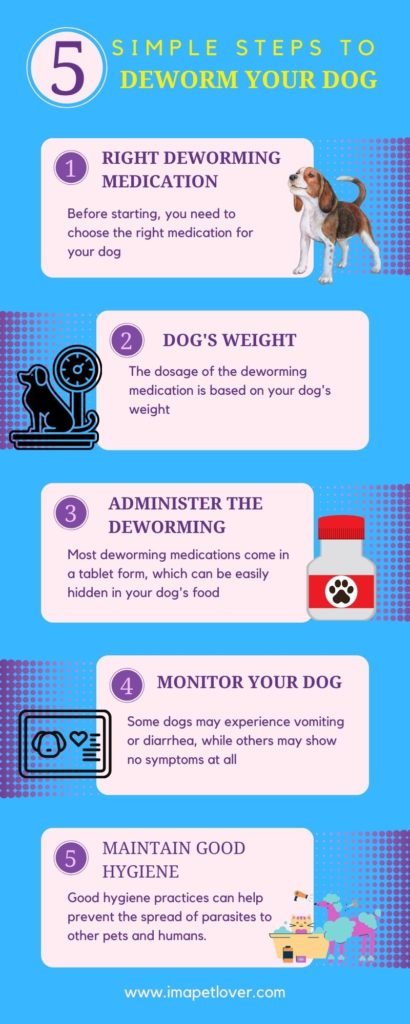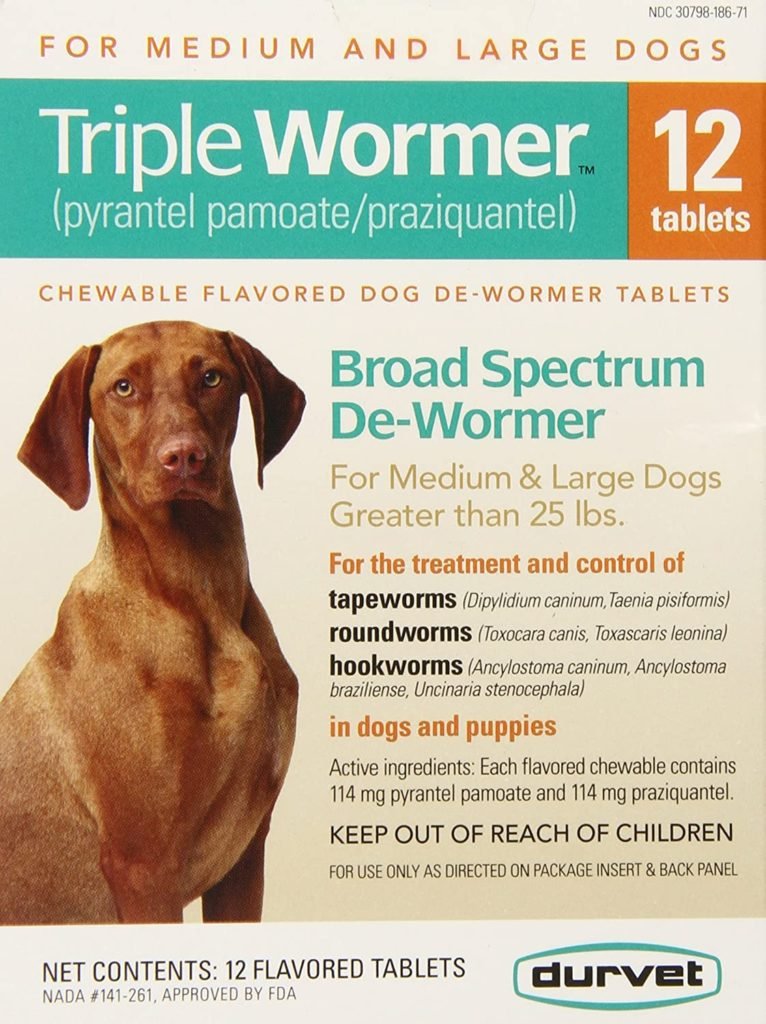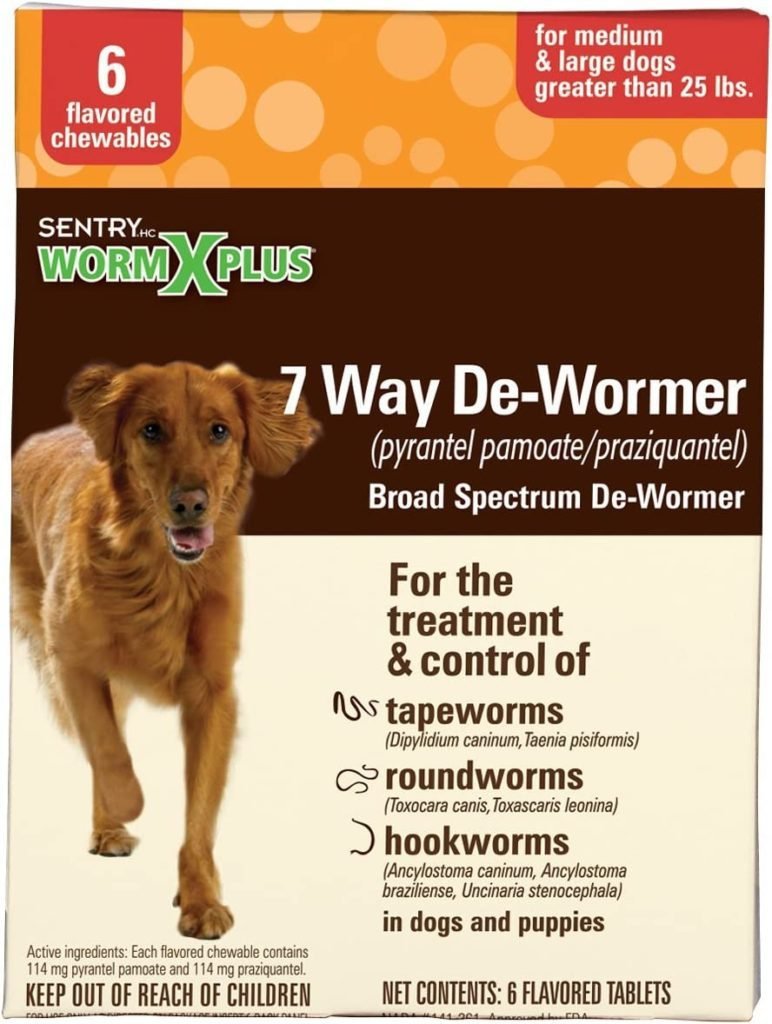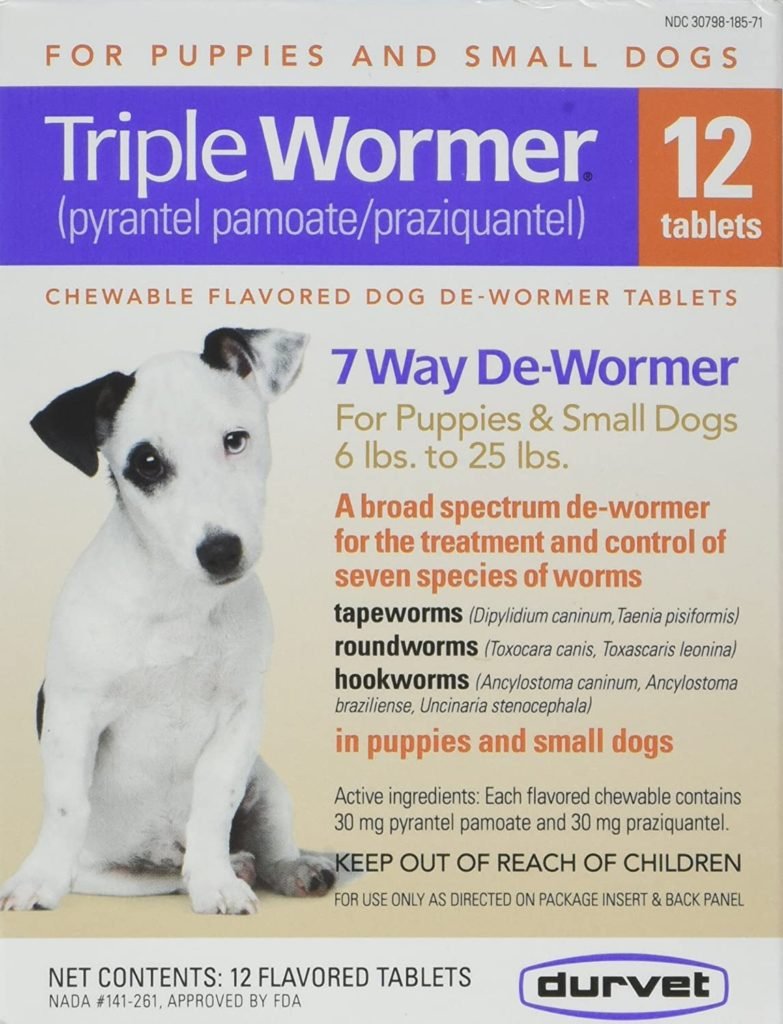Deworming your dog is essential to maintaining its overall health and well-being. Worms can cause various symptoms in dogs, including diarrhea, weight loss, poor coat condition, abdominal pain, and vomiting. By deworming your dog regularly, you can help to protect them from these harmful parasites. This blog post will explore the symptoms of worms in dogs, how to deworm your dog correctly, and preventive measures to keep your dog healthy and worm-free.
Symptoms of worms in dog
Diarrhea: Diarrhea is a frequent worm symptom in dogs. Other symptoms may occur, such as stomach discomfort, vomiting, and weight loss.
Weight loss: Lack of vitamin absorption due to worms might cause a dog to lose weight. Other symptoms like poor coat quality and reduced appetite may accompany this.
Poor coat condition: Hair loss and other coat issues, such as dryness and dullness, may be symptoms of worm infestation in dogs. Many causes, including hunger and worm-induced inflammation, can cause this.
Abdominal pain: Worms can cause stomach pain in dogs and other symptoms such as vomiting and diarrhea.
Vomiting: Vomiting is another symptom of worms in dogs, and it may cause diarrhea, gastrointestinal discomfort, and weight loss.
Loss of appetite: Worms can interfere with a dog’s ability to absorb nutrients from their food, leading to a loss of appetite.
Dullness or lethargy: Some worm-infected dogs become listless and unmotivated. That may be due to malnutrition or inflammation caused by worms.
Increased thirst: Dogs with worms may drink more water than usual, as their bodies may be trying to compensate for the fluids lost through diarrhea or vomiting.
Anemia: Anemia, or a deficiency of red blood cells, is a common symptom of worms in dogs. Pale gums and mucous membranes may accompany this.
Coughing or respiratory problems: Coughing or respiratory problems may occur in dogs with lungworm infections. Other symptoms, such as weight loss, lethargy, and anemia, may accompany these symptoms.
It’s important to note that not all dogs will exhibit all of these symptoms, and the severity of the symptoms may vary depending on the type of worms present and the dog’s overall health. If you notice any of these symptoms in your dog, consult a veterinarian quickly as possible to receive the appropriate treatment.
How to deworming your dog correctly:
Deworming your dog correctly is essential to ensure the best possible outcome and protect the dog health. Here are some critical steps to follow when deworming your dog:
- Please consult with a veterinarian: It’s essential to consult with a veterinarian before deworming your dog. Your veterinarian can recommend the appropriate deworming medication and provide dosing instructions.
- Choose the appropriate deworming medication: Several types of deworming medications are available for dogs. Your veterinarian can recommend the best option for your dog based on age, health status, and the type of worms present.
- Follow the dosing instructions carefully: It’s essential to follow the instructions provided by your veterinarian to ensure that your dog receives the correct medication dosage.

Prevention of worms in dogs:
Preventing worms in dogs is the best way to keep them healthy and worm-free. Some steps you can take to prevent worms in your dog include:
- Regular deworming: Dewing your dog regularly can help prevent the buildup of worms in their system. Your veterinarian can recommend a deworming schedule that is appropriate for your dog.
- Practice good hygiene: Practicing good hygiene can help to reduce the risk of worms in your dog. That includes washing your hands thoroughly after handling your dog or their feces, disposing of wastes in a sealed container, and keeping your dog’s living areas clean.
- Keep dogs away from contaminated areas: Worms may spread through polluted soil, water, and other materials. To reduce the danger of worms, keep your dog away from areas soiled with feces or other materials containing worms.
You may also interest: Tick on Dogs: Protect Your Dog from These Bloodsucking Parasites
Types of dewormers for dogs
There are several different types of deworming products available for dogs. These medications are intended to kill worms and prevent dog infestations. Deworming products for dogs include:
- Oral medications: Oral dewormers are administered orally as a single dose or as part of a course of therapy. These drugs, which come from tablets, capsules, or liquids, are designed to kill worms and prevent further infestations.
- Injectable medications: Injectable deworming treatments should be administered by a veterinarian. These drugs can treat severe infestations or prevent worm spreading in kennel settings.
- Topical medications: Topical deworming drugs are administered to the skin and are usually available as spot-on treatments or shampoos. These drugs kill worms on touch and can be used to prevent or treat existing infestations.
- Natural dewormers: Certain pet owners may prefer natural deworming solutions with herbs and other natural components. These items might help kill worms and avoid infestations. However, before using any natural deworming treatments, please consult a veterinarian to confirm that they are safe and acceptable for your dog.
You may also interest:Worms in Dogs: A Common, But Often Overlooked Threat
Suggested Products
In conclusion, deworming your dog is essential to maintaining its overall health and well-being. Following the steps outlined above, you can deworm your dog correctly and protect them from harmful worms. Regular deworming and preventive measures such as practicing good hygiene and keeping your dog away from contaminated areas can also help to reduce the risk of worms. By taking these precautions, you can help to keep your dog healthy and worm-free.





